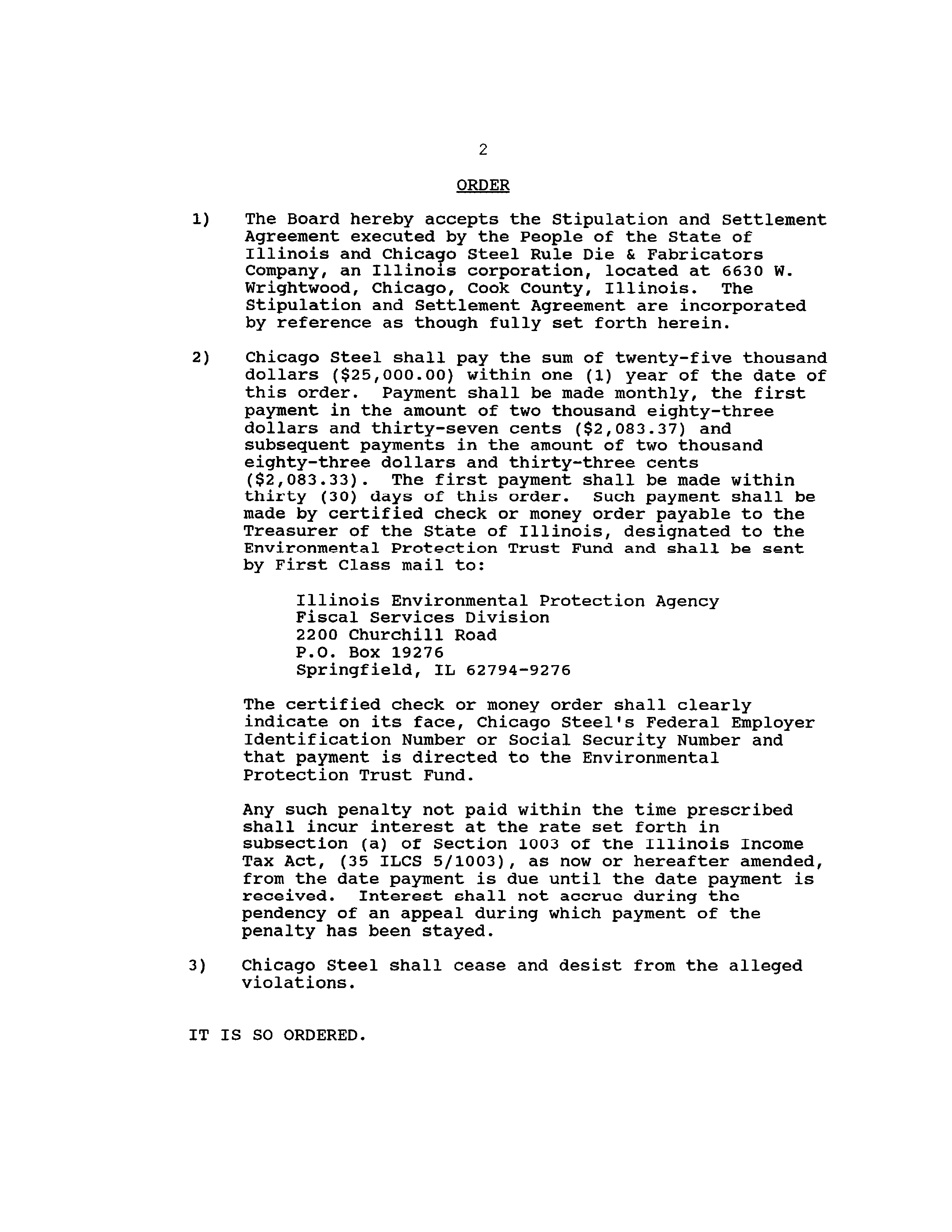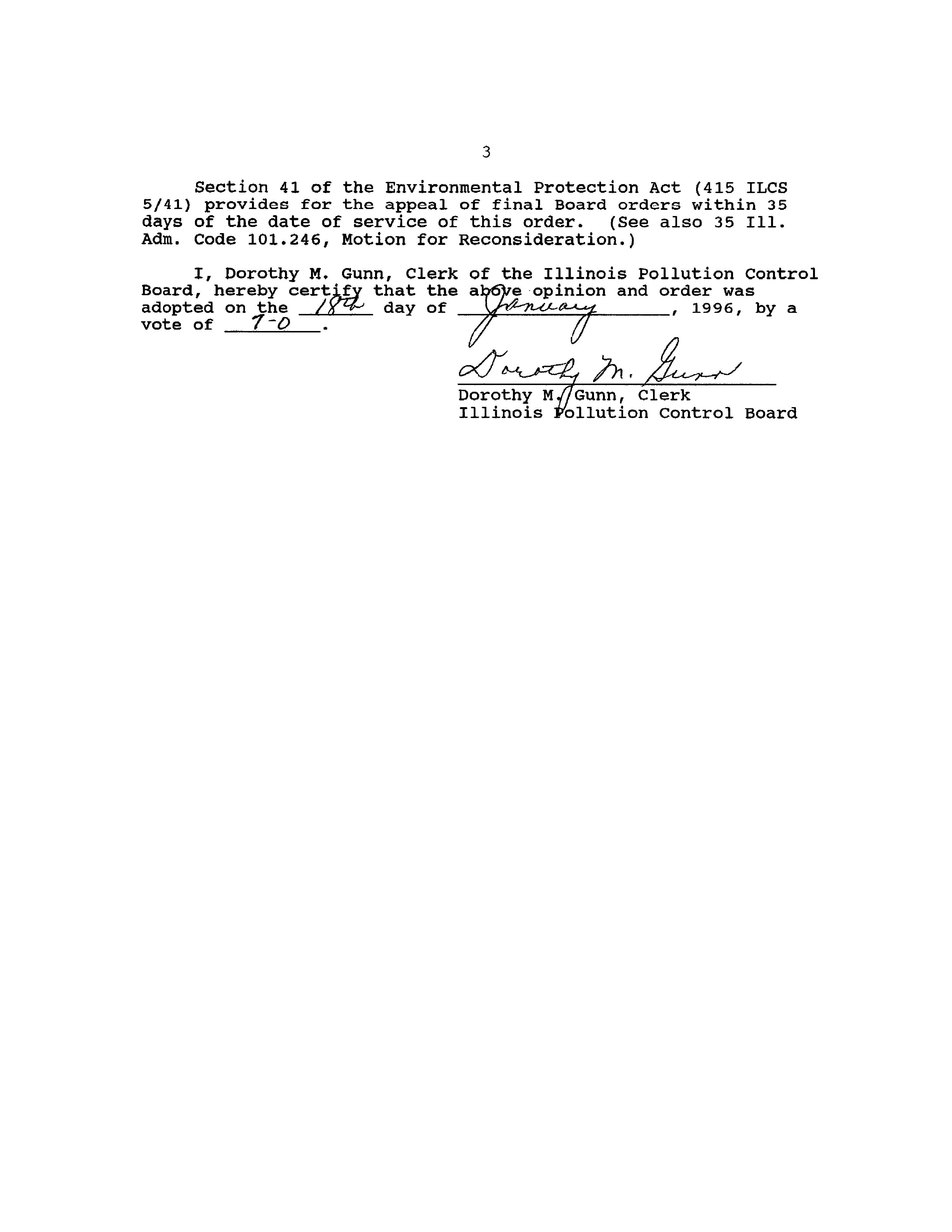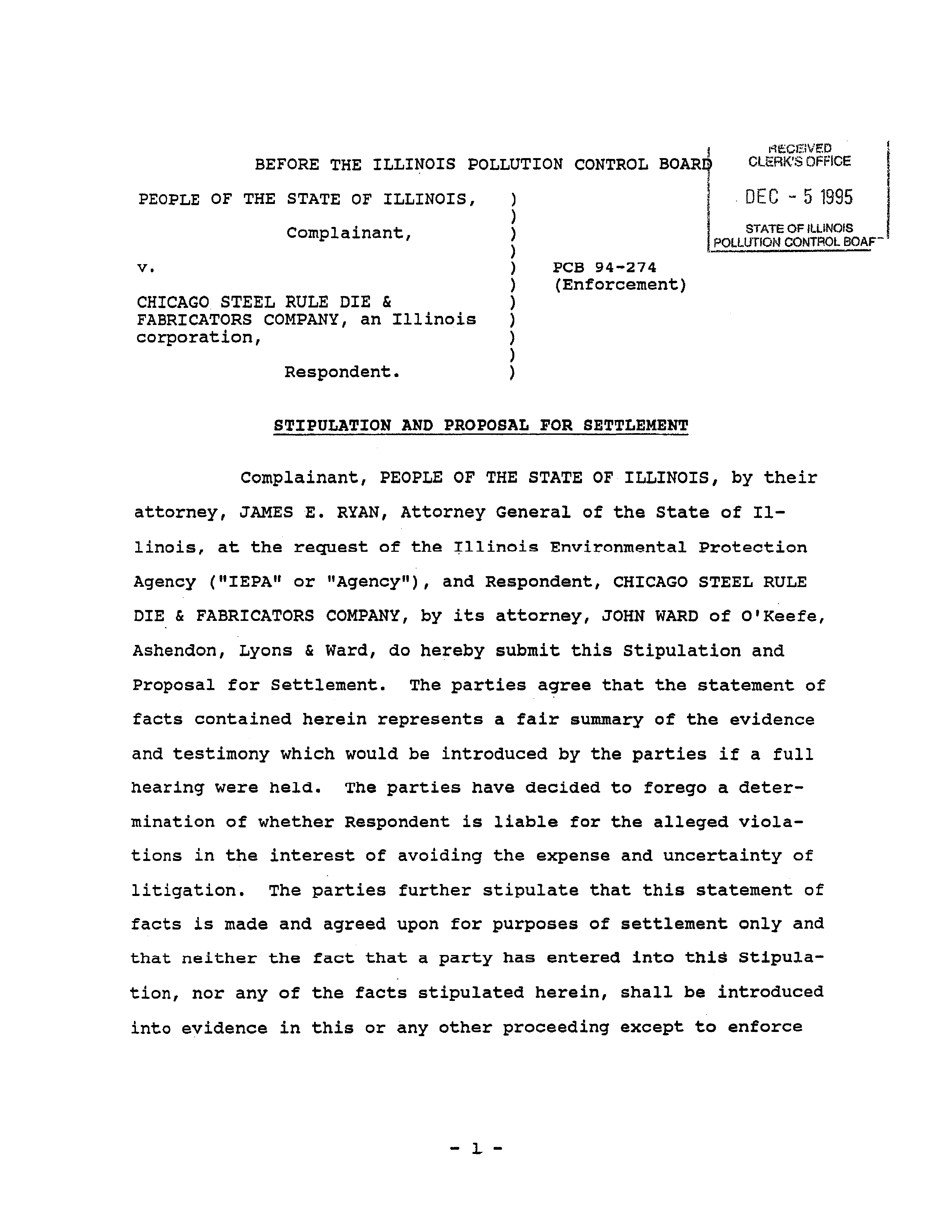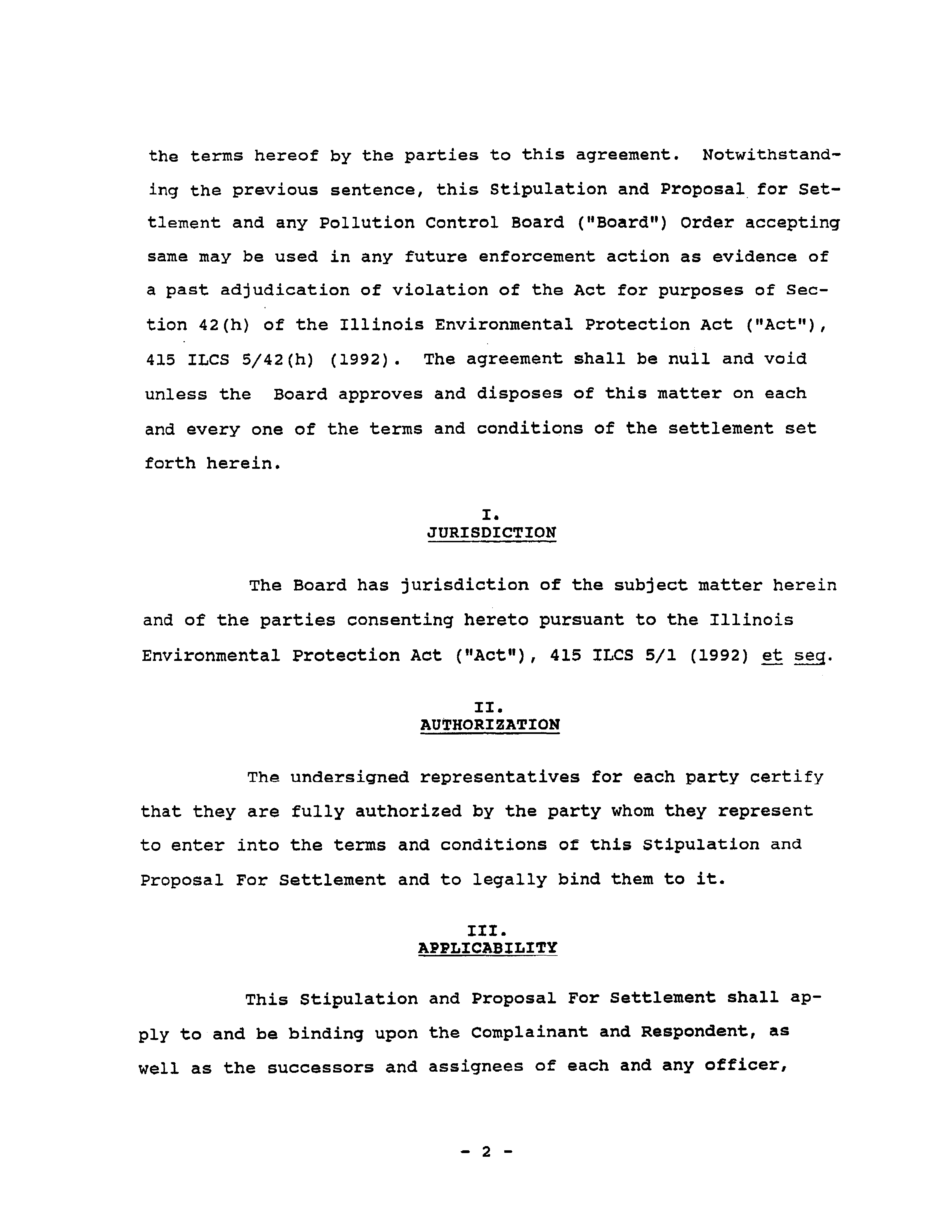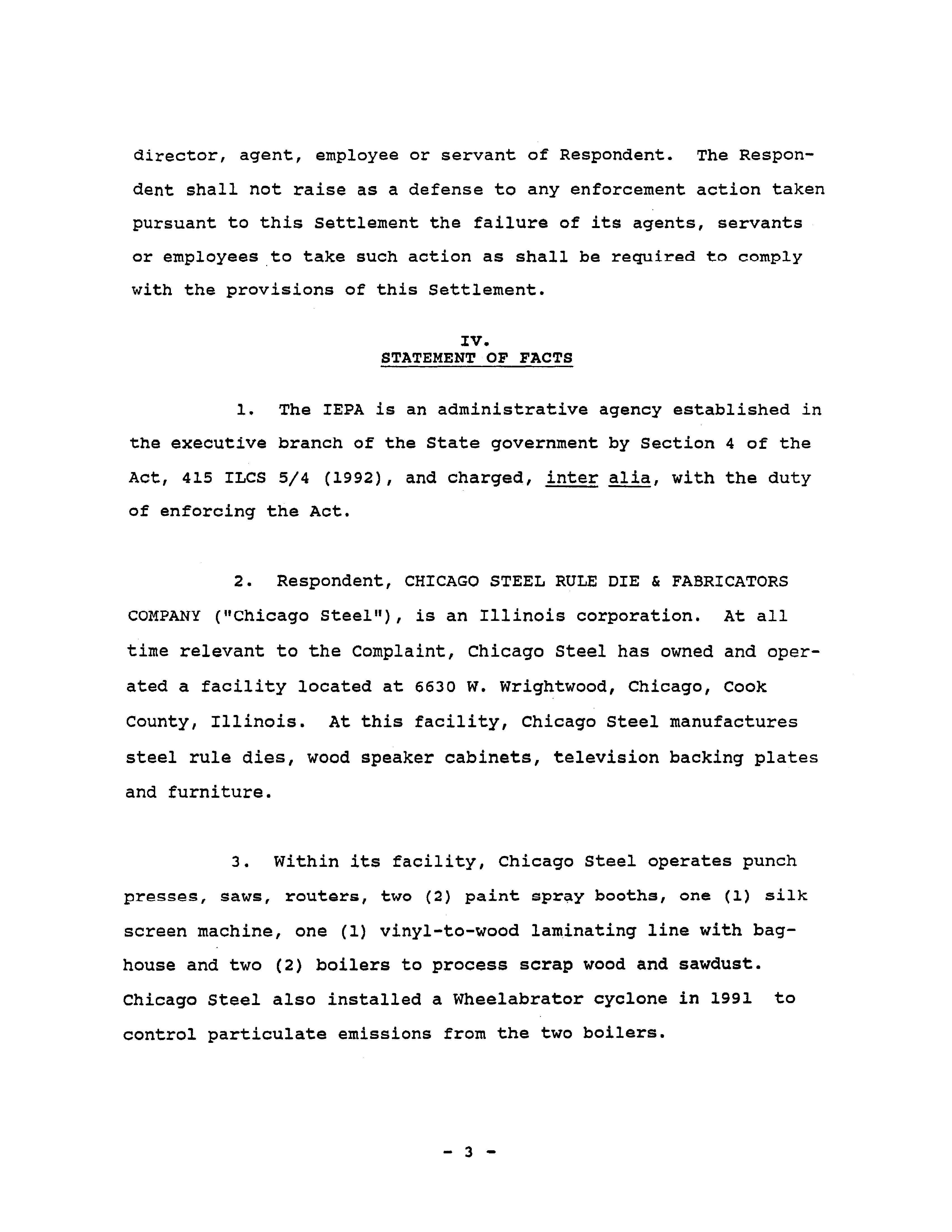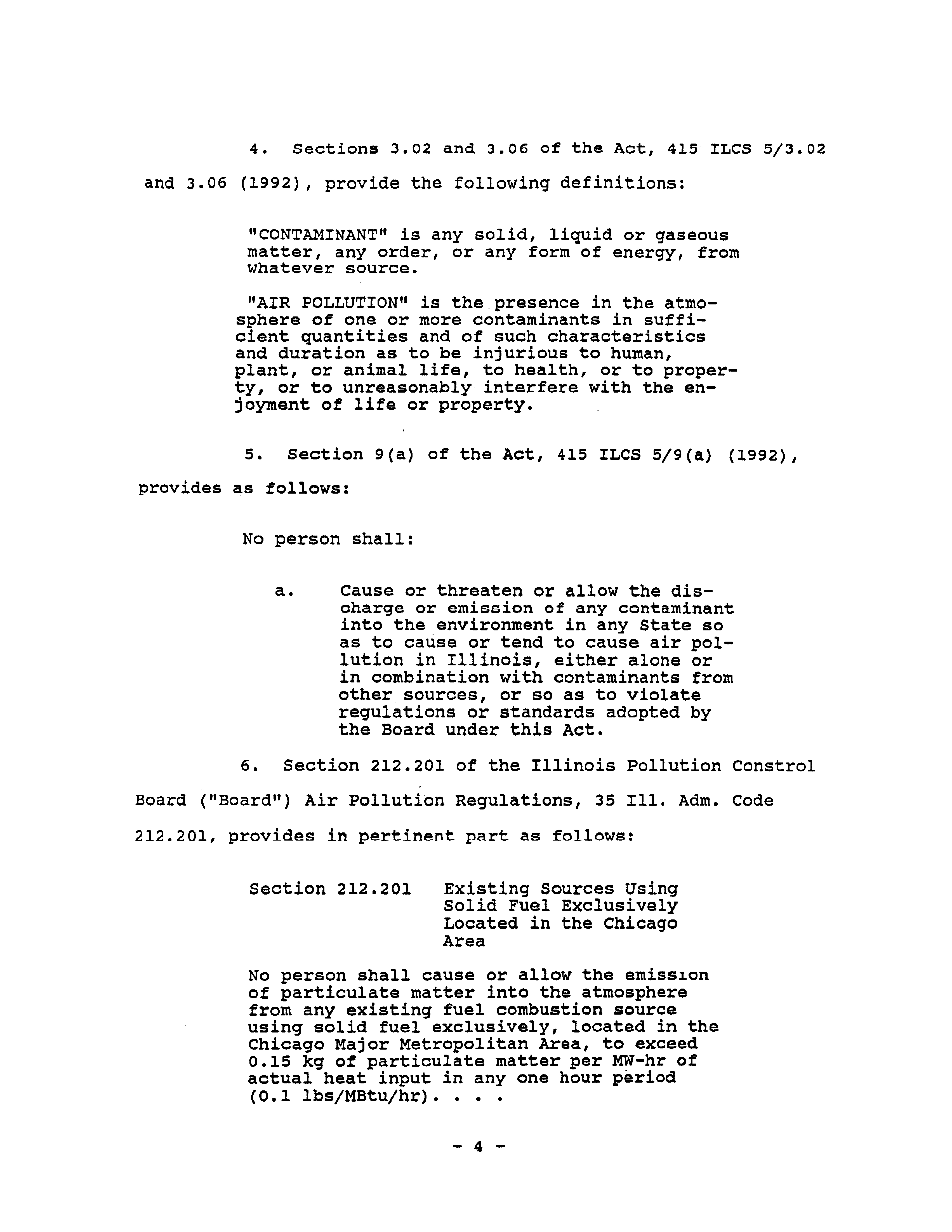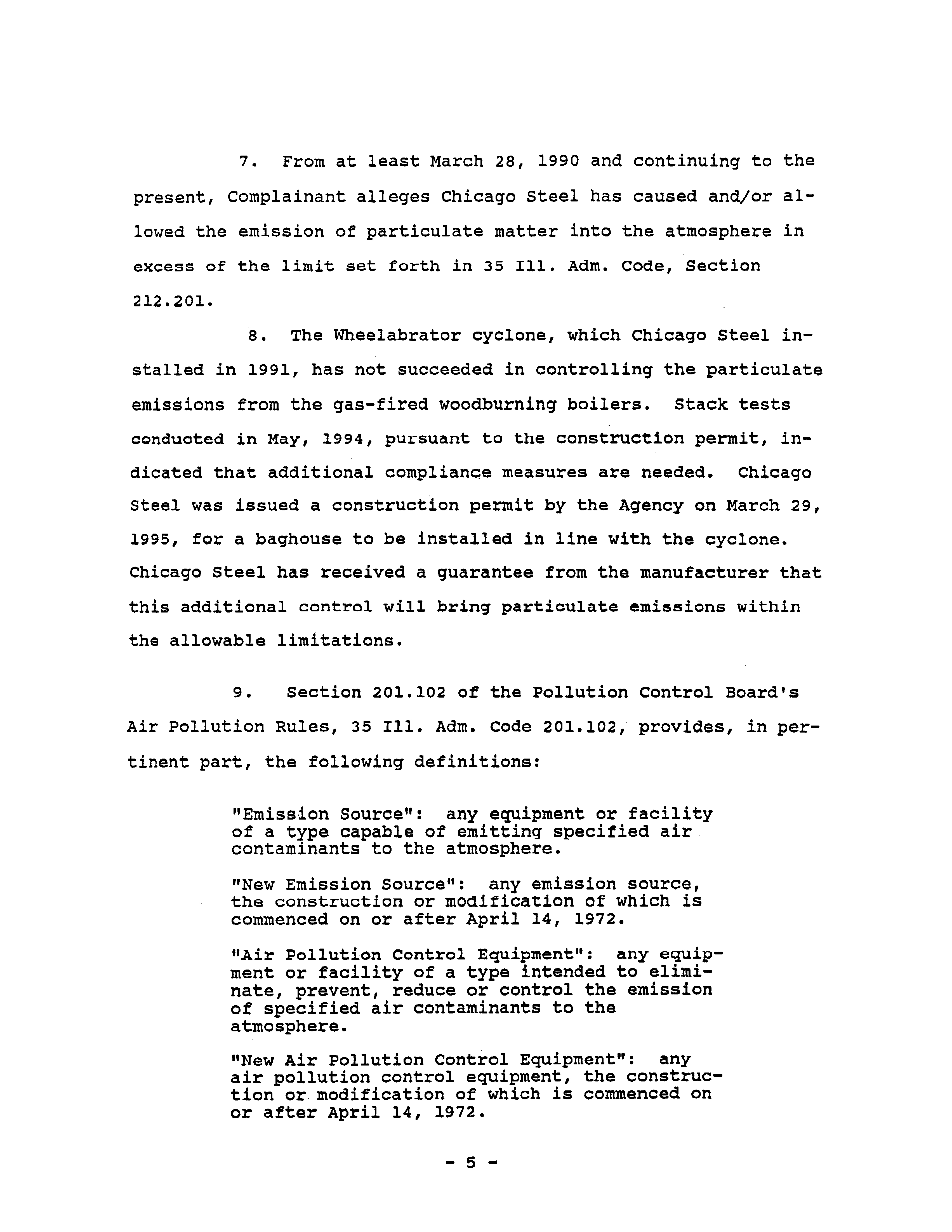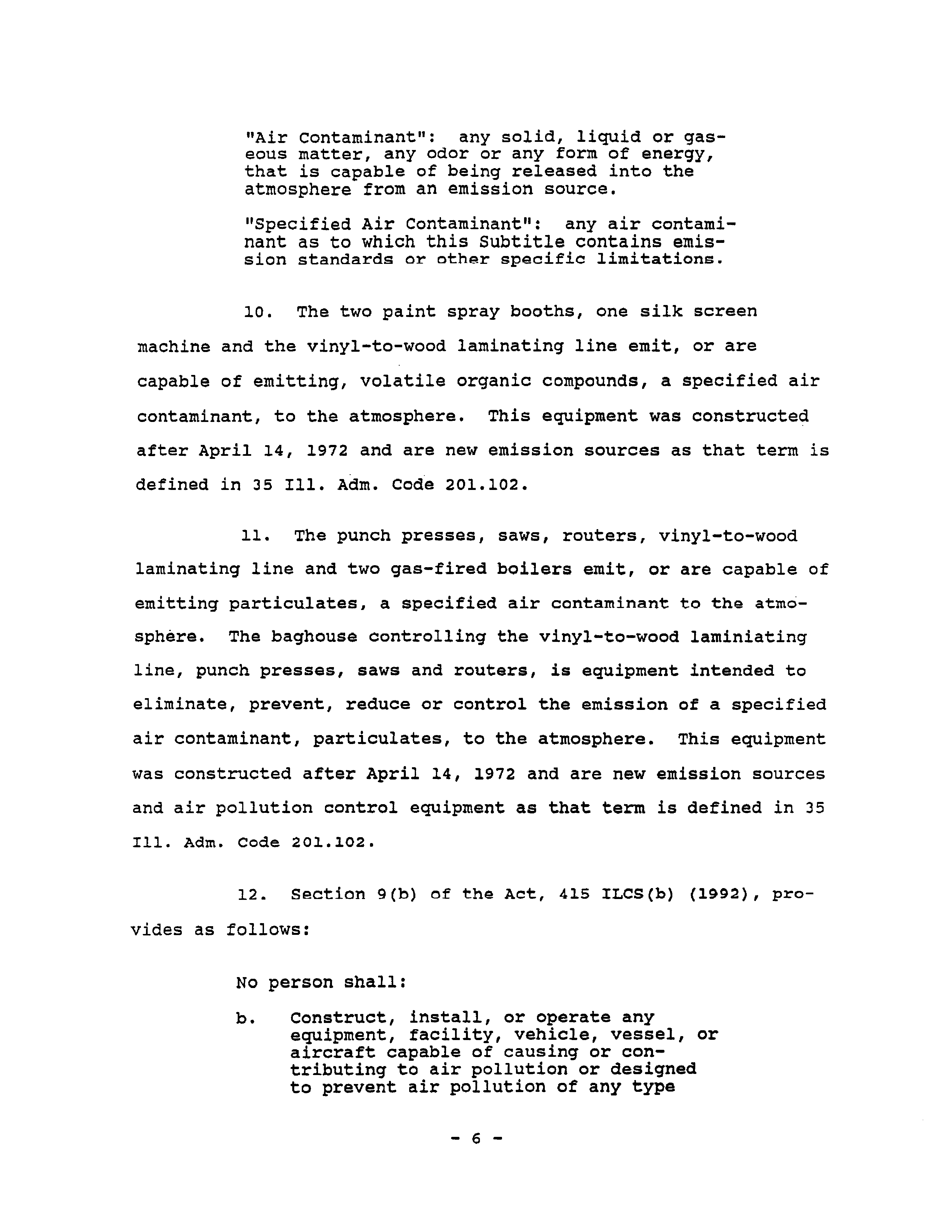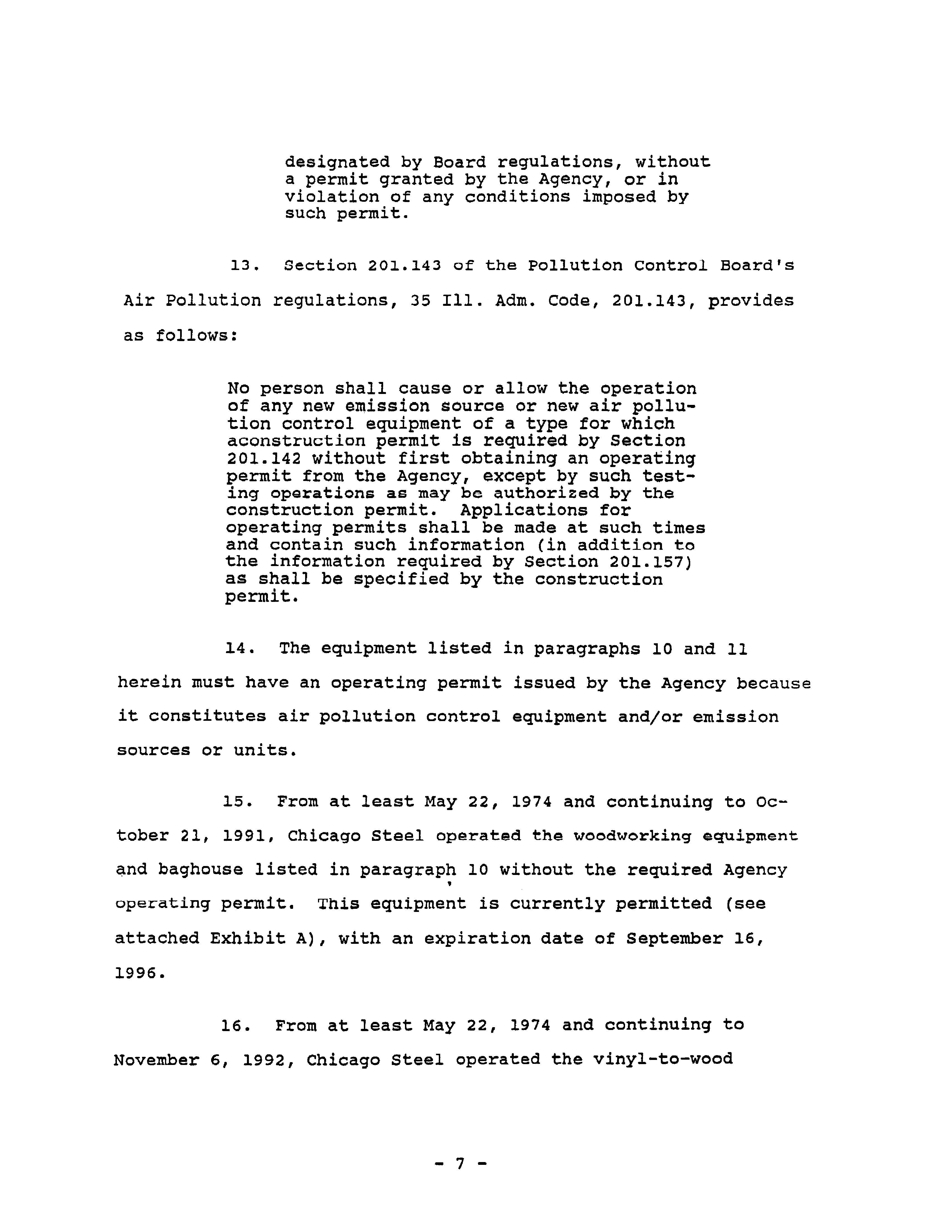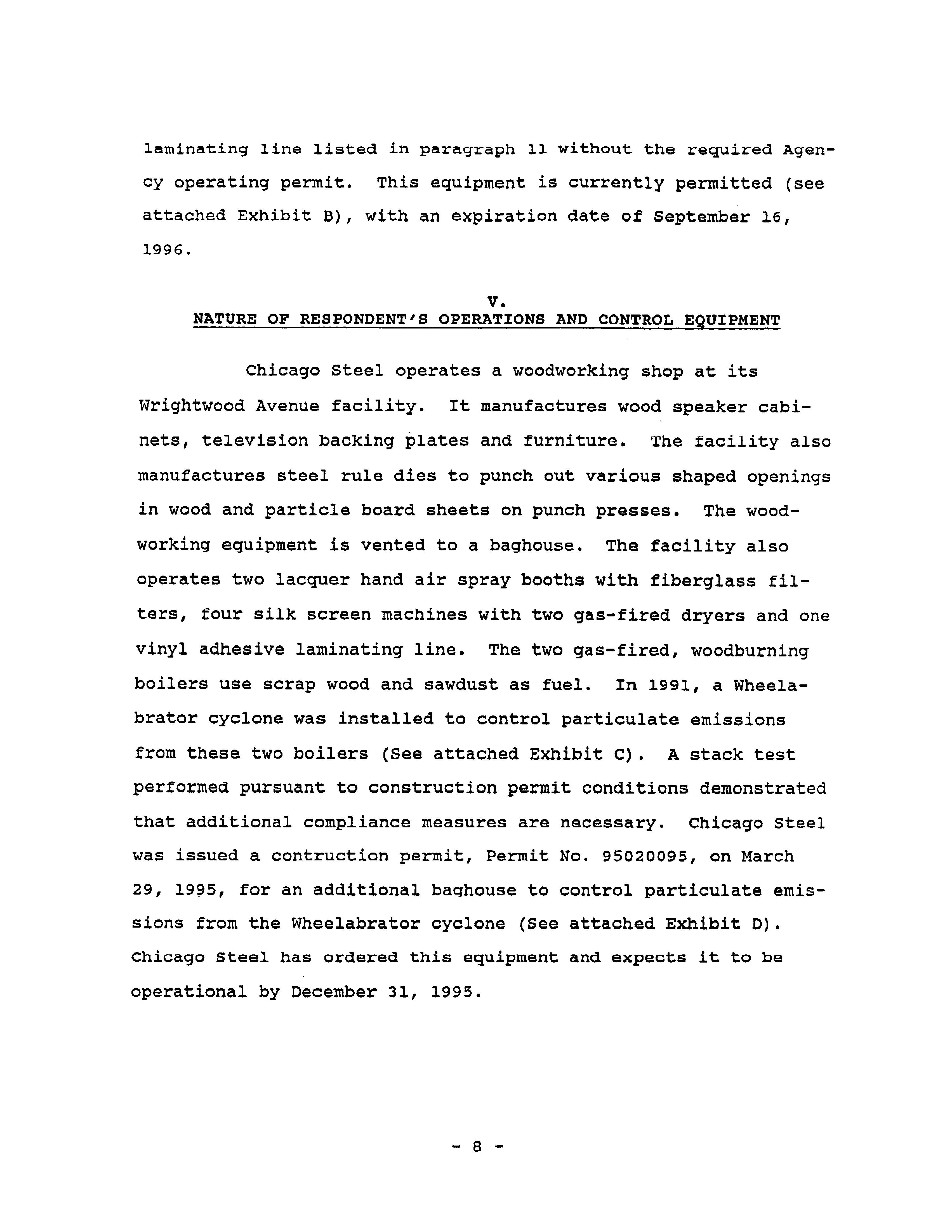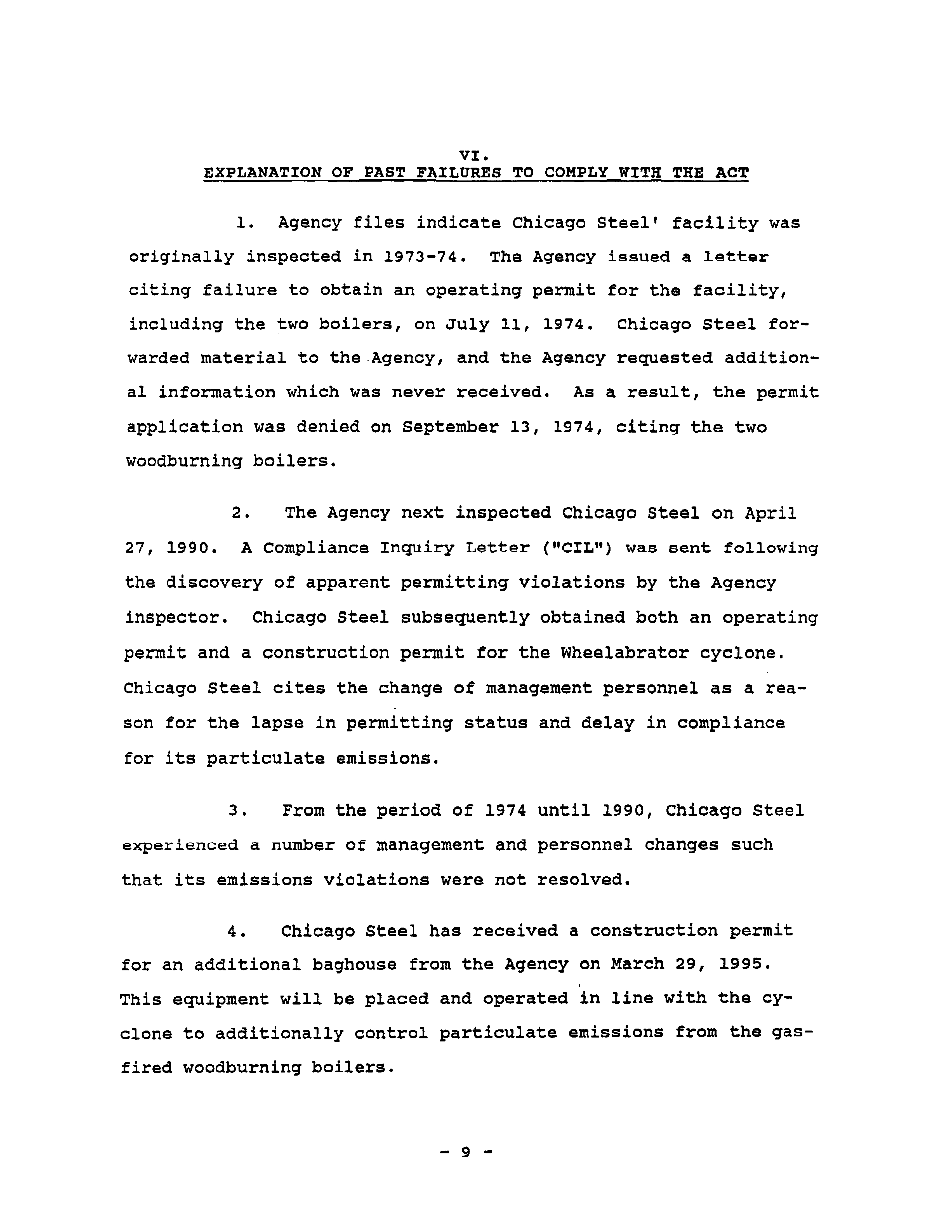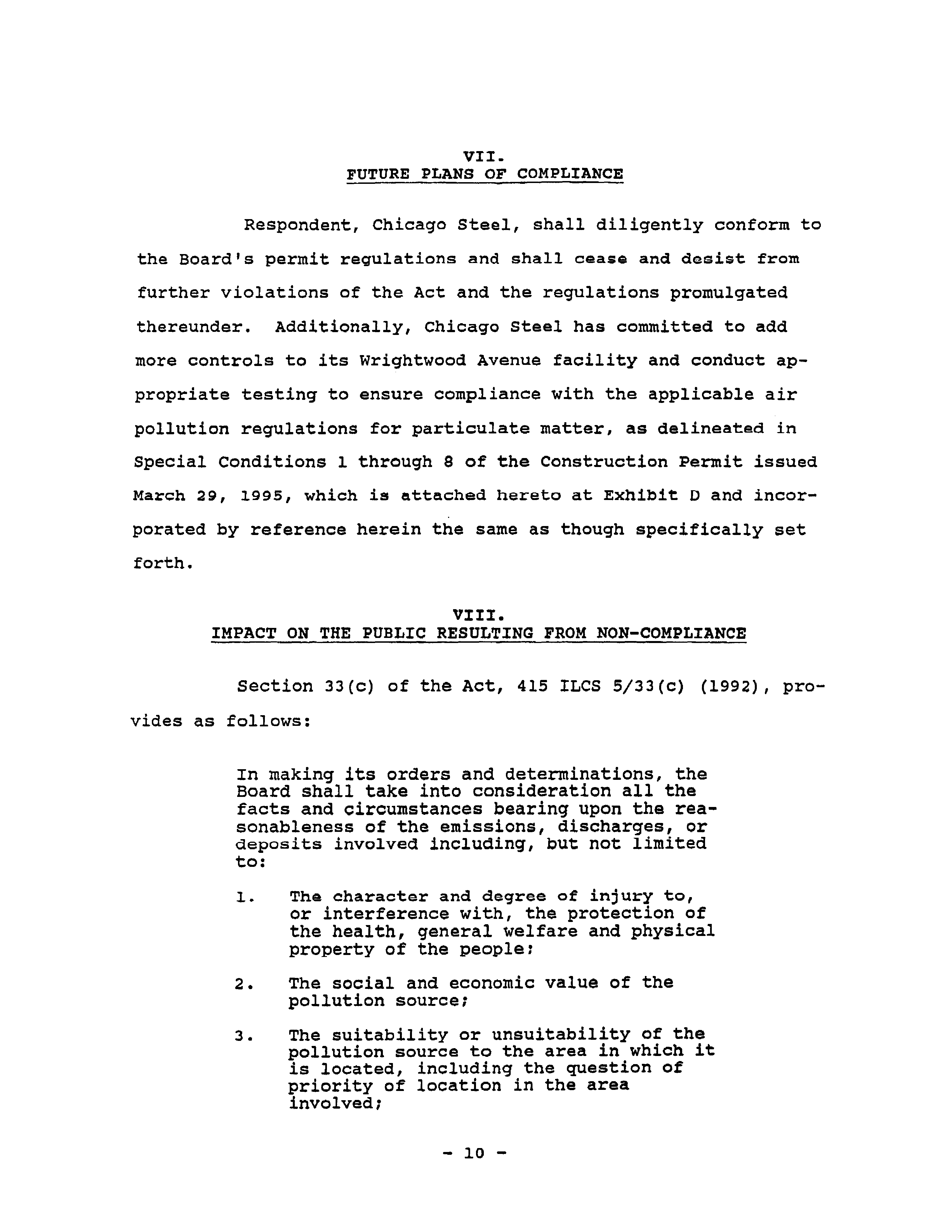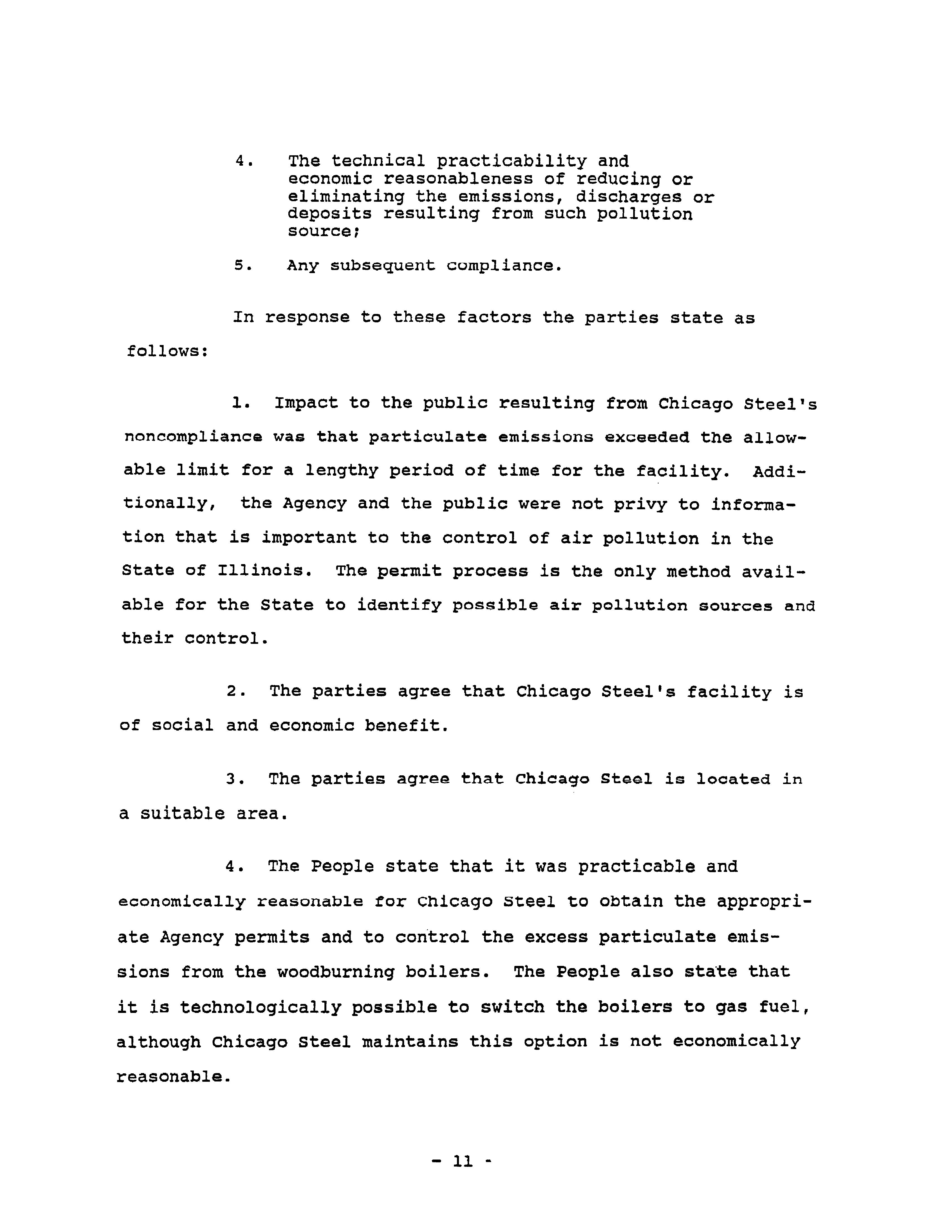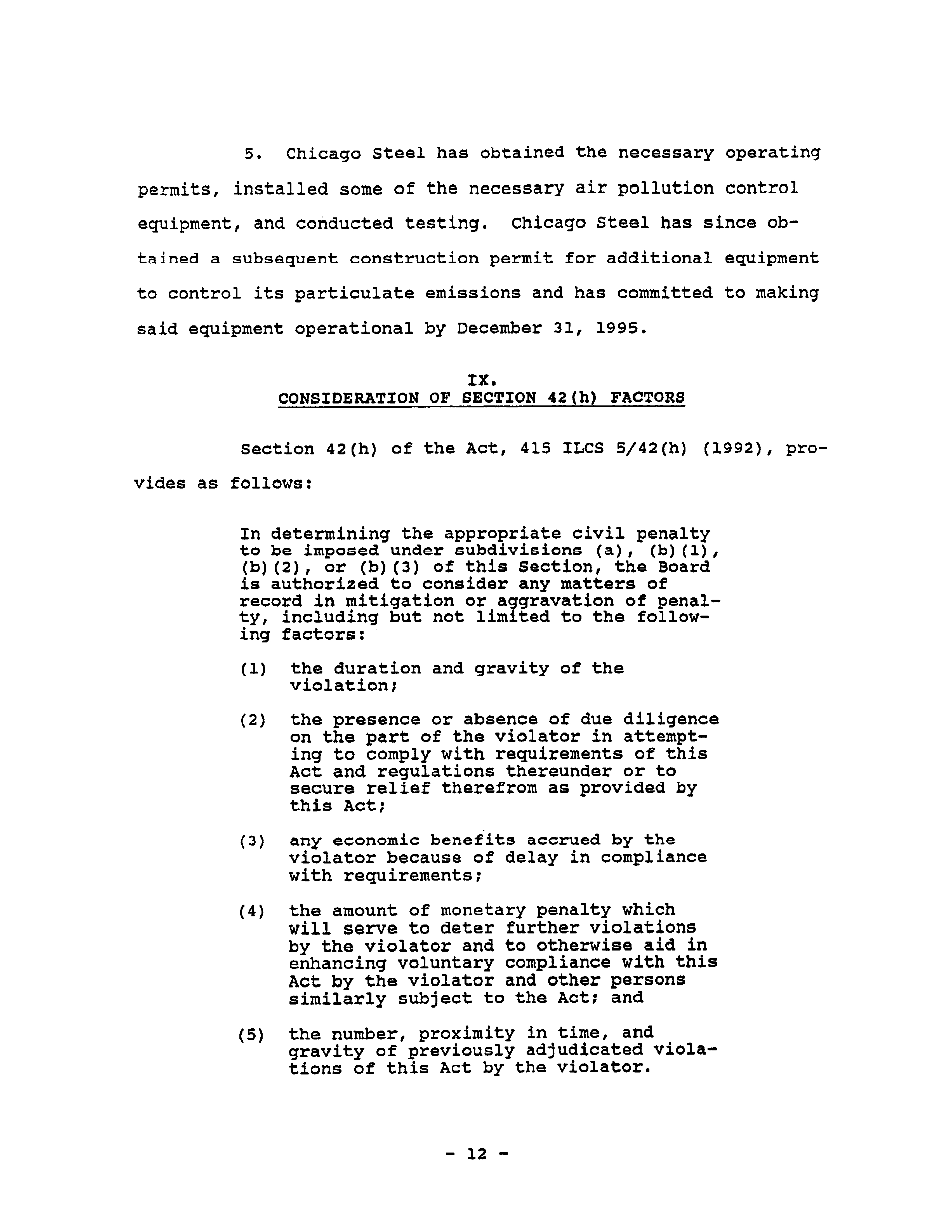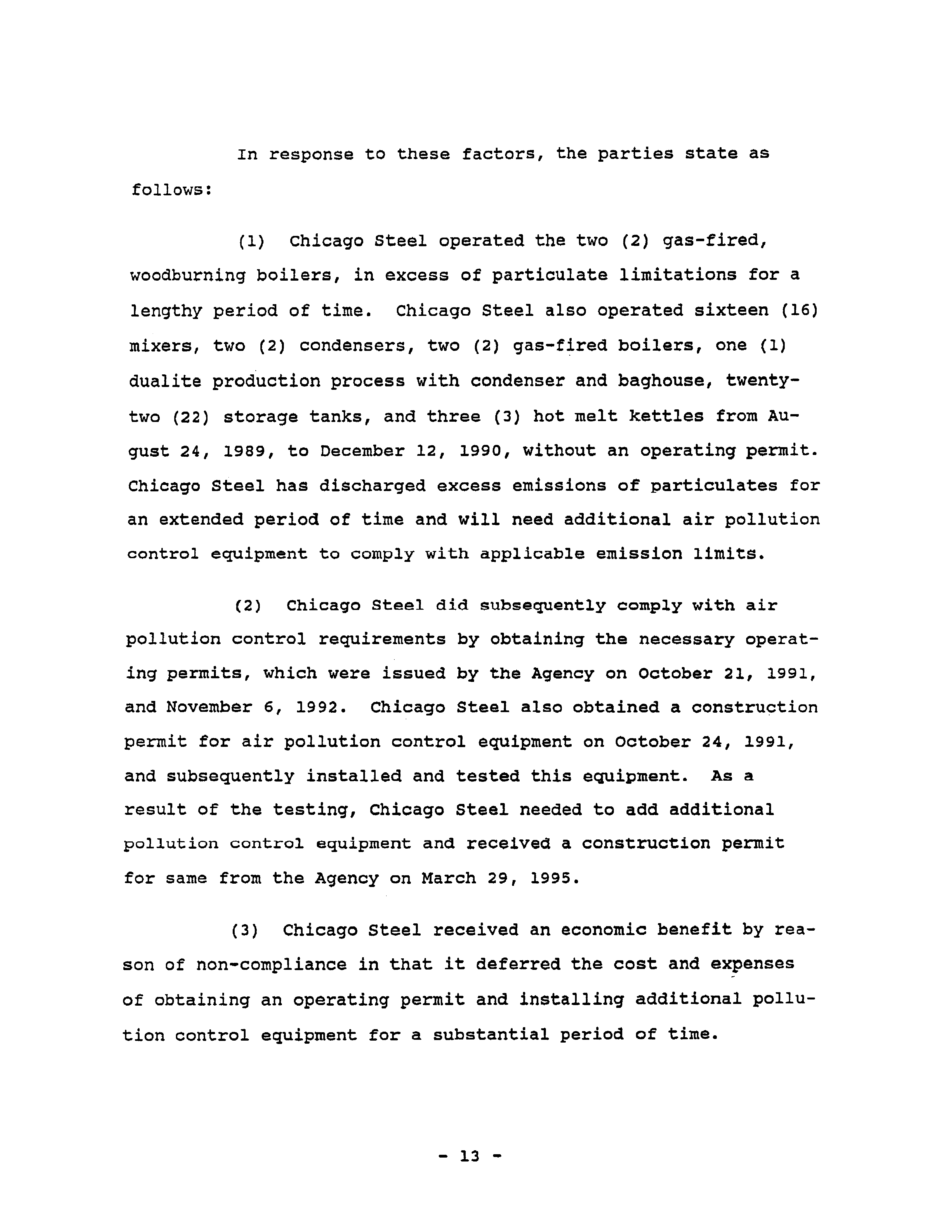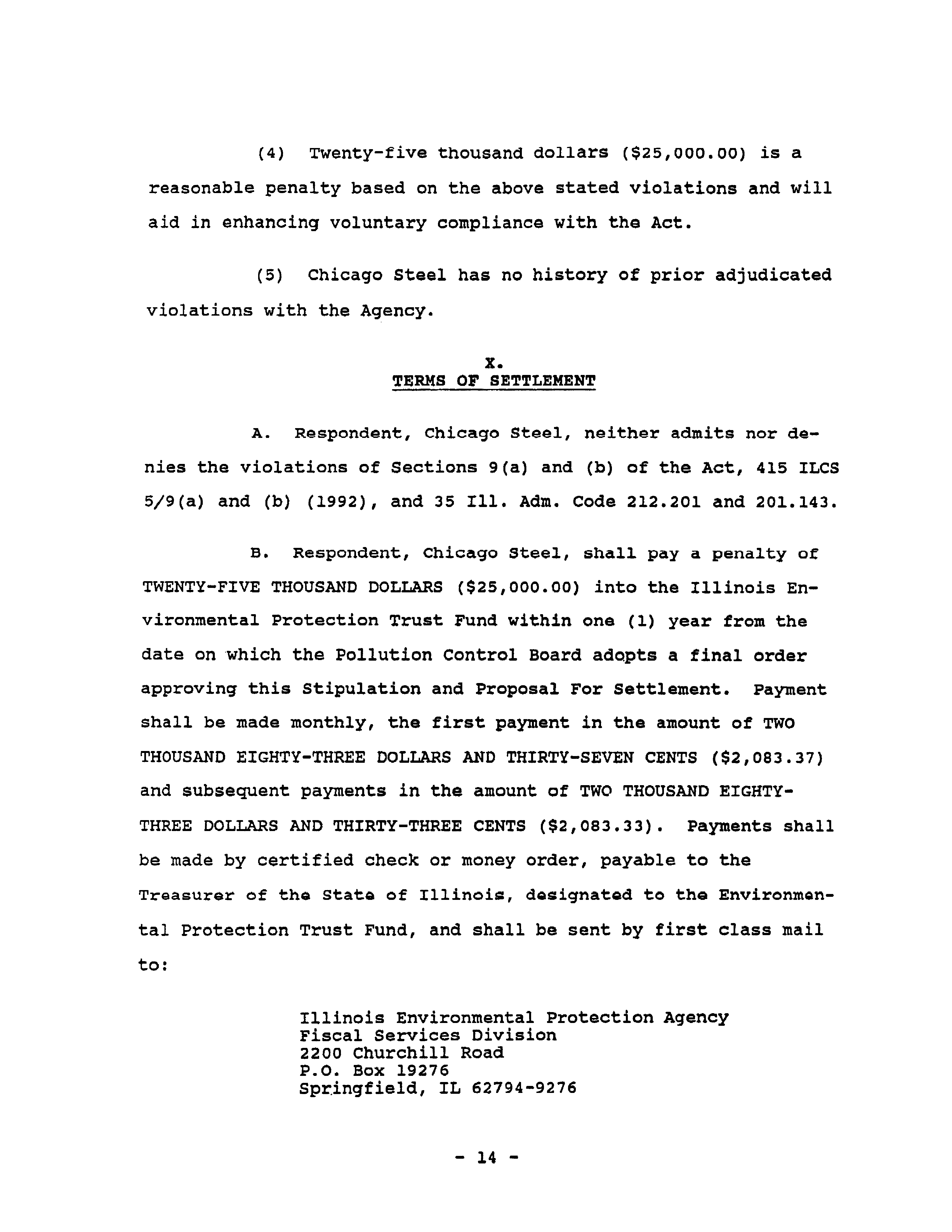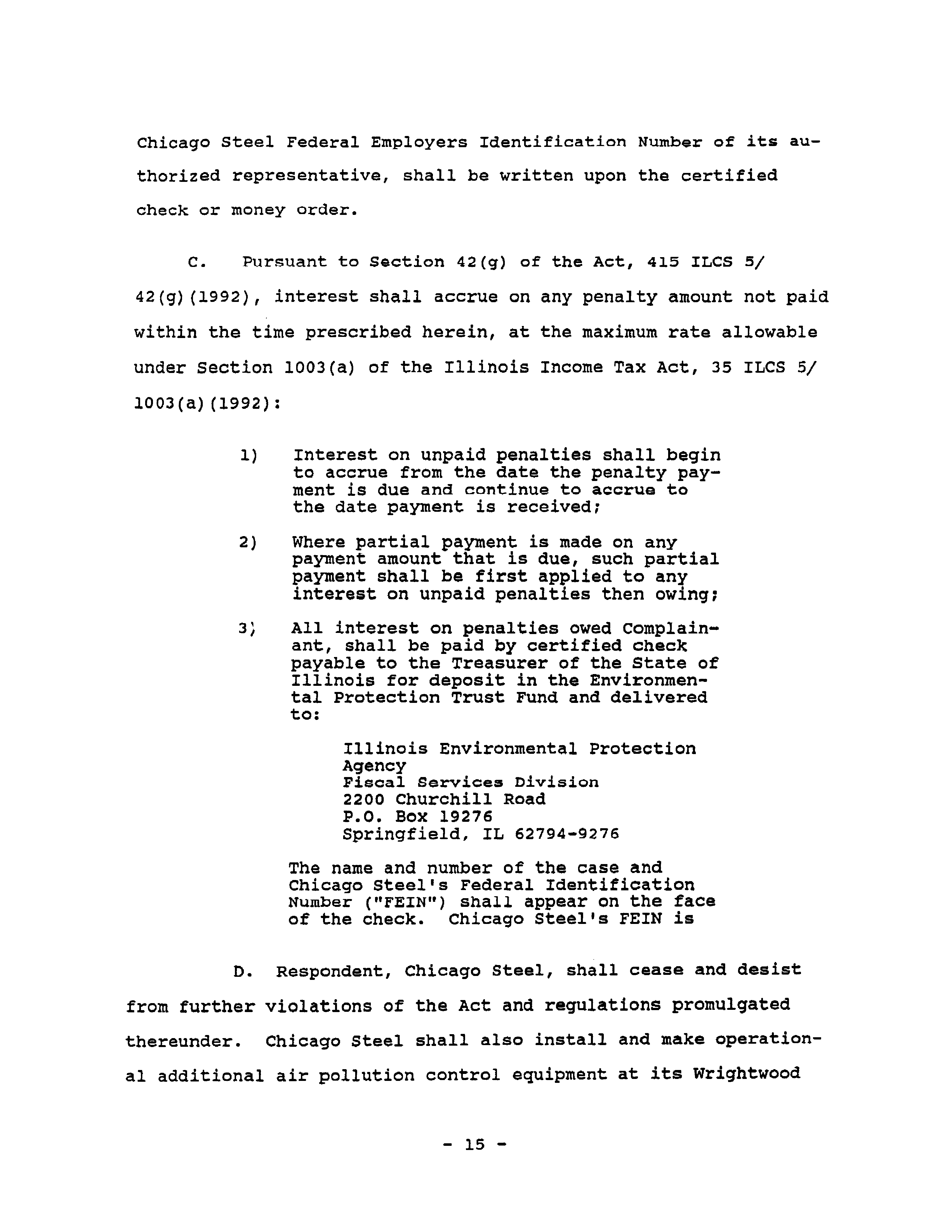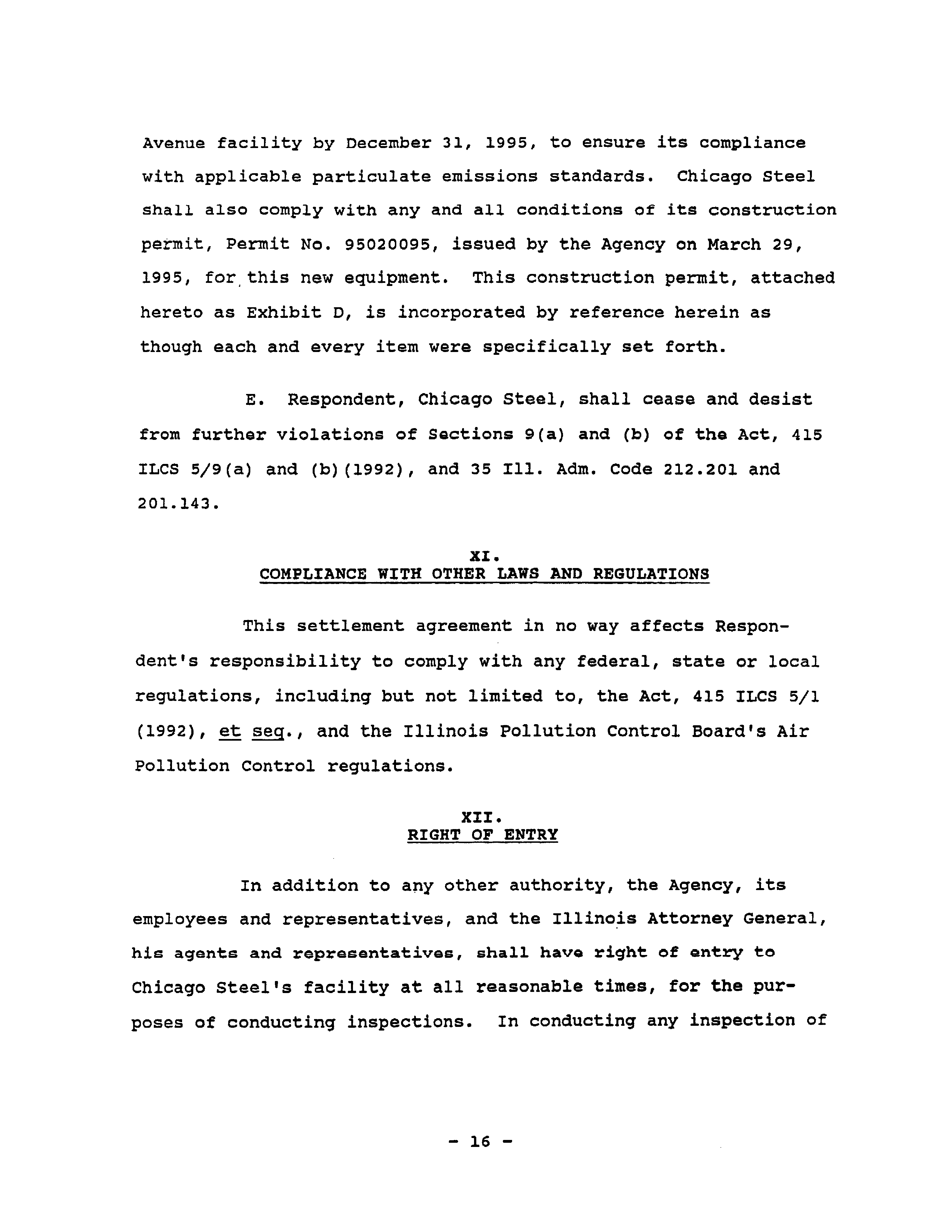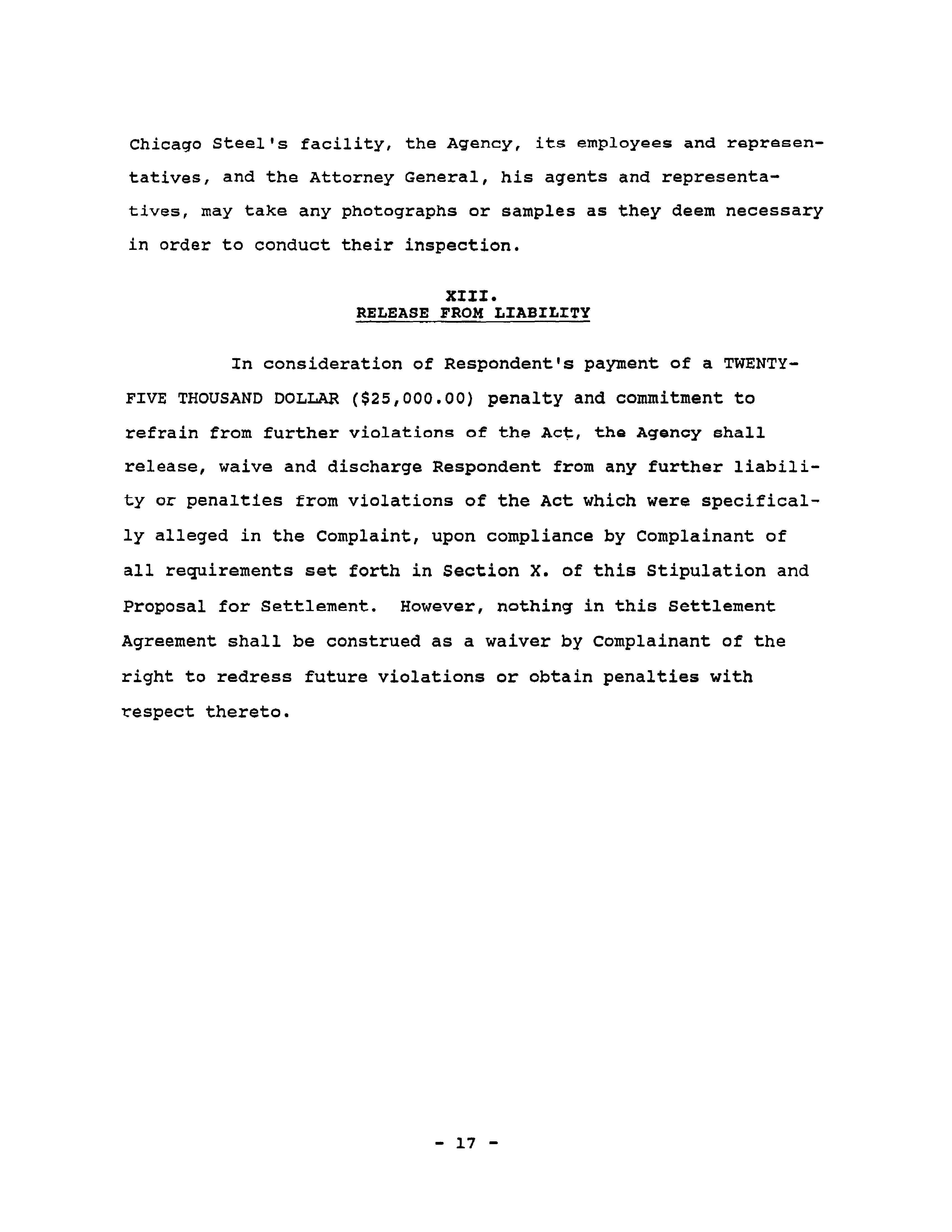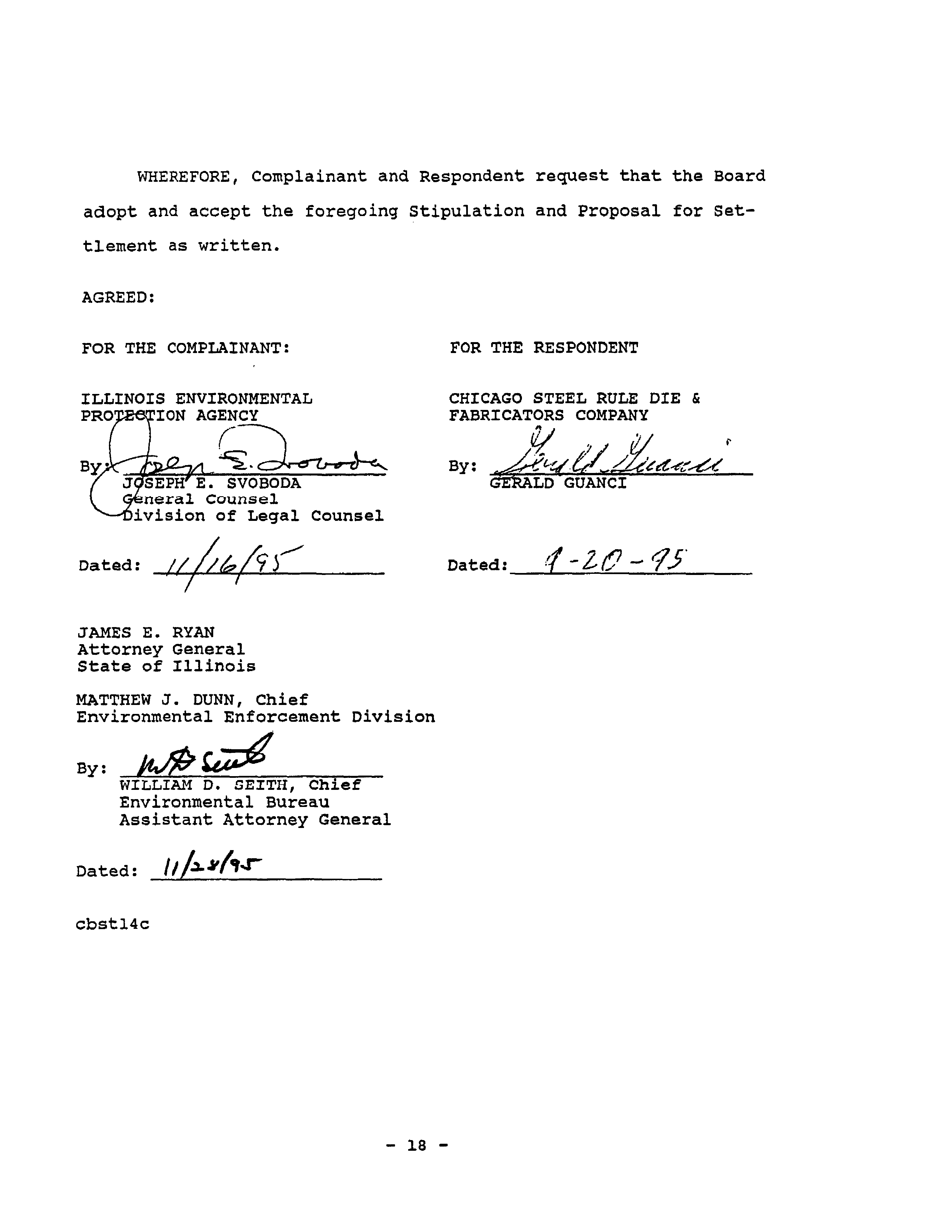ILLINOIS POLLUTION CONTROL
BOARD
January
18,
1996
PEOPLE OF THE STATE
)
OF ILLINOIS,
Complainant,
v.
)
PCB
94—274
)
(Enforcement-Air)
CHICAGO STEEL RULE DIE &
)
FABRICATORS COMPANY,
an
)
Illinois corporation,
)
Respondent.
OPINION
AND
ORDER OF THE BOARD
(by M. McFawn):
This matter comes berore the Board upon a two—count
complaint filed September 27,
1994, by the Attorney General of
the State of Illinois, on behalf of the Illinois Environmental
Protection Agency and the People of the State of Illinois,
against Chicago Steel Rule Die & Fabricators Company
(Chicago
Steel), an Illinois corporation, located at 6630 W. Wrightwood,
Chicago,
Cook County,
Illinois.
The complaint alleges that
Chicago Steel has violated Sections 9(a) and 9(b)
of the Illinois
Environmental Protection Act
(Act), 415 ILCS 5/9(a),
5/9(b) and
35 Ill.
Adm. Code 201.143 and 212.201 by causing emissions in
excess of permited limits and by operating an emission source
without the proper permits.
Pursuant to 415 ILCS 5/31(a) (2), the parties filed a joint
motion requesting relief from the Act’s hearing requirement on
December 5,
1995.
The Board published a notice of the waiver on
December 14,
1995; no objection to the granting of the waiver was
received.
Waiver of hearing is hereby granted.
The parties filed a Stipulation and Settlement Agreement on
December 5,
1995.
The Stipulation sets forth facts relating to
the nature, operations and circumstances surrounding the claimed
violations.
Chicago Steel neither admits nor denies the alleged
violations and agrees to pay a civil penalty of twenty-five
thousand dollars
($25,000.00).
The Board finds the Settlement Agreement acceptable under 35
Ill.
Adm.
Code 103.180.
This settlement agreement in no way
affects respondent’s responsibility to comply with any federal,
state or local regulations, including but not limited to the Act
and the Board’s pollution control regulations.
This opinion constitutes the Board’s findings of fact and
conclusions of law in this matter.
2
ORDER
1)
The Board hereby accepts the Stipulation and Settlement
Agreement executed by the People of the State of
Illinois and Chicago Steel Rule Die & Fabricators
Company, an Illinois corporation,
located at 6630 W.
Wrightwood, Chicago, Cook County,
Illinois.
The
Stipulation and Settlement Agreement are incorporated
by reference as though fully set forth herein.
2)
Chicago Steel shall pay the sum of twenty-five thousand
dollars ($25,000.00)
within one
(1) year of the date of
this order.
Payment shall be made monthly,
the first
payment in the amount of two thousand eighty-three
dollars and thirty-seven cents
($2,083.37) and
subsequent payments in the amount of two thousand
eighty-three dollars and thirty-three cents
($2,083.33).
The first payment shall be made within
thirty
(30) days of this order.
Such payment shall be
made by certified check or money order payable to the
Treasurer of the State of Illinois, designated to the
Environmental Protection Trust Fund and shall
be sent
by First Class mail to:
Illinois Environmental Protection Agency
Fiscal Services Division
2200 Churchill Road
P.O. Box 19276
Springfield,
IL 62794—9276
The certified check or money order shall clearly
indicate on its face, Chicago Steel’s Federal Employer
Identification Number or Social Security Number and
that payment is directed to the Environmental
Protection Trust Fund.
Any such penalty not paid within the time prescribed
shall incur interest at the rate set forth in
subsection
(a)
Ot Section 1003 or the Illinois Income
Tax Act,
(35 ILCS 5/1003),
as now or hereafter amended,
from the date payment is due until the date payment is
received.
Interest shall not accruo during tho
pendency of an appeal during which payment of the
penalty has been stayed.
3)
Chicago Steel shall cease and desist from the alleged
violations.
IT IS SO ORDERED.
3
Section 41 of the Environmental Protection Act
(415 ILCS
5/41) provides for the appeal of final Board orders within 35
days of the date of service of this order.
(See also 35 Ill.
Adm. Code 101.246, Motion for Reconsideration.)
I, Dorothy M.
Gunn,
Clerk of the Illinois Pollution Control
Board, hereby cert~~ythat the a176)le opinion and order was
adopted on the
/Y’1—’
day of
(../YJitz~eta..~
,
1996,
by a
vote of
7c7
.
£7
Dorothy MflGunn, Clerk
Illinois Vollution Control Board
iCE~V~D
BEFORE THE ILLINOIS POLLUTION CONTROL BOARI~
CLERK?S
OFFICE
PEOPLE OF THE STATE OF ILLINOIS,
)
DEC
5
1995
Corn lainant
STATE
OFIWNOfS
p
POLLUT~O14
CONTROL
SOAF
v.
)
PCB
94—274
(Enforcement)
CHICAGO. STEEL RULE DIE &
)
FABRICATORS COMPANY,
an Illinois
)
corporation,
Respondent.
STIPULATION AND PROPOSAL POR SETTLEMENT
Complainant, PEOPLE OF THE STATE OF ILLINOIS, by their
attorney,
JAMES
E. RYAN, Attorney General of the State of Ii—
liriois,
at the request of the Illinois Environmental Protection
Agency (“IEPA” or “Agency”), and Respondent, CHICAGO STEEL RULE
DIE & FABRICATORS COMPANY, by its attorney, JOHN WARD of O’Keefe,
Ashendon, Lyons
& Ward,
do hereby submit this Stipulation and
Proposal for Settlement.
The parties agree that the statement of
facts contained herein represents a fair summary of the evidence
and testimony which would be introduced by the parties if a full
hearing were held.
The parties have decided to forego a deter-
mination of whether Respondent
is liable for the alleged viola-
tions in the interest of avoiding the expense and uncertainty of
litigation.
The parties further stipulate that this statement of
facts is made and agreed upon for purposes of settlement only and
that neither the fact that a party has entered into this Stipula-
tion, nor any of the facts stipulated herein, shall be introduced
into evidence in this or any other proceeding except to enforce
-
the terms hereof by the parties to this agreement.
Notwithstand-
ing the previous sentence, this Stipulation and Proposal for Set-
tiernent and any Pollution Control Board
(“Board”) Order accepting
same may be used in any future enforcement action as evidence of
a past adjudication of violation of the Act for purposes of Sec-
tion 42(h)
of the Illinois Environmental Protection Act
(“Act”),
415 ILCS 5/42 (h)
(1992).
The agreement shall be null and void
unless the
Board approves and disposes of this matter on each
and every one of the terms and conditions of the settlement set
forth herein.
I.
JURISDICTION
The Board has jurisdiction of the subject matter herein
and of the parties consenting hereto pursuant to the Illinois
Environmental Protection Act (“Act”), 415 ILCS 5/1
(1992) et
~.
II.
AUTHORIZATION
The undersigned representatives for each party certify
that they are fully authorized by the party whom they represent
to enter into the terms and conditions of this Stipulation and
Proposal For Settlement and to legally bind them to it.
III.
APPLICABILITY
This Stipulation and Proposal For Settlement shall ap-
ply to and be binding upon the Complainant and Respondent,
as
well as the successors and assignees of each and any officer,
—2—
director, agent, employee or servant of Respondent.
The Respon-
dent shall not raise as a defense to any enforcement action taken
pursuant to this Settlement the failure of its agents,
servants
or employees to take such action as shall be requirAd to comply
with the provisions of this Settlement.
Iv.
STATEMENT OF FACTS
1.
The IEPA is an administrative agency established in
the executive branch of the State government by Section 4 of the
Act,
415 ILCS 5/4
(1992),
and charged,
inter alia, with the duty
of enforcing the Act.
2.
Respondent, CHICAGO STEEL RULE DIE & FABRICATORS
COMPANY
(“Chicago Steel”),
is an Illinois corporation.
At all
time relevant to the Complaint, Chicago Steel has owned and oper-
ated a facility located at 6630
W. Wrightwood, Chicago, Cook
County,
Illinois.
At this facility,
Chicago Steel manufactures
steel rule dies, wood speaker cabinets, television backing plates
and furniture.
3.
Within its facility, Chicago Steel operates punch
presses, saws,
routers, two
(2) paint spray booths, one
(1) silk
screen machine, one
(I) vinyl-to-wood laminating line with bag-
house
arid two
(2) boilers to process scrap wood and sawdust.
Chicago Steel also installed a Wheelabrator cyclone in 1991
to
control particulate emissions from the two boilers.
—3—
4.
Sections 3.02 and 3.06 of the Act,
415 ILCS 5/3.02
and 3.06
(1992), provide the following definitions:
“CONTAMINANT” is any solid, liquid or gaseous
matter,
any order,
or any form of energy, from
Whatever source.
“AIR POLLUTION”
is thepresence in the atmo-
sphere of one or more contaminants
in suffi—
cient quantities and of such characteristics
and duration as to be injurious to human,
plant,
or animal life,
to health, or to proper-
ty, or to unreasonably interfere with the en-
joyment of life or property.
5.
Section 9(a) of the Act,
415 ILCS 5/9(a)
(1992),
provides as follows:
No person shall:
a.
Cause or threaten or allow the dis-
charge or emission of any contaminant
into the environment in any State so
as to cause or tend to cause air p01-
lution in Illinois, either alone or
in combination with contaminants from
other sources, or so as to violate
regulations or standards adopted by
the Board under this Act.
6.
Section 212.201 of the Illinois Pollution Constrol
Board
(“Board”) Air Pollution Regulations,
35 Ill.
Adm. Code
212.201, provides in pertinent part as follows:
Section 212.201
Existing Sources Using
Solid Fuel Exclusively
Located in the Chicago
Area
No person shall cause or allow the emission
of particulate matter into the atmosphere
from any existing fuel combustion source
using solid fuel exclusively,
located in the
Chicago Major Metropolitan Area,
to exceed
0.15 kg of particulate matter per NW-hr of
actual heat input in any one hour period
(01 lbs/MBtu/hr).
.
.
—4—
7.
From at least March 28,
1990 and continuing to the
present,
Complainant alleges Chicago Steel has caused and/or al-
lowed the emission of particulate matter into the atmosphere in
excess
of
the limit set forth in 35 Ill. Adm.
Code, Section
212.201.
8.
The Wheelabrator cyclone, which Chicago Steel in-
stalled in 1991, has not succeeded in controlling the particulate
emissions from the gas-fired woodburning boilers.
Stack tests
conducted in May,
1994, pursuant to the construction permit, in-
dicated that additional compliance measures are needed.
Chicago
Steel was issued a construction permit by the Agency on March 29,
1995,
for a baghouse to be installed in line with the cyclone.
Chicago Steel has received a guarantee from the manufacturer that
this additional control will bring particulate emissions within
the allowable limitations.
9.
Section 201.102 of the Pollution Control Board’s
Air Pollution Rules,
35 Ill. Adm.
Code 201.102, provides, in per-
tinent part, the following definitions:
“Emission Source”:
any equipment or facility
of a type capable of emitting specified air
contaminants to the atmosphere.
“New Emission Source”:
any emission source,
the construction or modification of which is
commenced on or after April 14,
1972.
“Air Pollution Control Equipment”:
any equip-
ment or facility of a type intended to elimi-
nate,
prevent,
reduce or control the emission
of specified air contaminants to the
atmosphere.
“New Air Pollution Control Equipment”:
any
air pollution control equipment, the construc-
tion or modification of which is commenced on
or after April
14,
1972.
—5—
“Air Contaminant”:
any solid, liquid or gas-
eous matter, any odor or any form of energy,
that is capable of being released into the
atmosphere from an emission source.
“Specified Air Contaminant”:
any air contami-
nant as to which this Subtitle contains emis-
sion standards or other specific limitations.
10.
The two paint spray booths, one silk screen
machine and the vinyl-to-wood laminating line emit,
or are
capable of emitting, volatile organic compounds,
a specified air
contaminant, to the atmosphere.
This equipment was constructed
after April
14,
1972 and are new emission sources as that term
is
defined in 35 Ill. Adm. Code 201.102.
11.
The punch presses,
saws,
routers, vinyl—to-wood
laminating line and two gas-fired boilers emit,
or are capable of
emitting particulates, a specified air contaminant to the atmo-
sphere.
The baghouse controlling the vinyl-to—wood laininiating
line, punch presses, saws and routers,
is equipment intended to
eliminate,
prevent, reduce or control the emission of a specified
air contaminant, particulates, to the atmosphere.
This equipment
was constructed after April 14, 1972 and are new emission sources
and air pollution control equipment as that term is defined in
35
Ill. Adm. Code 201.102.
12.
Section 9(b)
of the Act, 415 ILCS(b)
(1992), pro-
vides as follows:
No person shall:
b.
Construct,
install, or operate any
equipment,
facility, vehicle, vessel, or
aircraft capable of causing or con-
tributing to air pollution or designed
to prevent air pollution of any type
—6—
designated by Board regulations, without
a permit granted by the Agency, or in
violation of any conditions imposed by
such permit.
13,
Section 201.143
of the
Pollution Control Board’s
Air Pollution regulations,
35 Ill. Adm. Code,
201.143, provides
as follows:
No person shall cause or allow the operation
of any new emission source or new air pollu-
tion control equipment of a type for which
aconstruction permit is required by Section
201.142 without first obtaining an operating
permit from the Agency, except by such test-
ing operations as may be authorized by the
construction permit.
Applications for
operating permits shall be made at such times
and contain such information
(in addition to
the information required by Section 201.157)
as shall be specified by the construction
permit.
14.
The equipment listed in paragraphs 10 and 11
herein must have an operating permit issued by the Agency because
it constitutes air pollution control equipment and/or emission
sources or units.
15.
From at least May 22,
1974 and continuing to Oc-
tober
21,
1991,
Chicago Steel operated the woodworking equipment
and baghouse listed in paragraph 10 without the required Agency
operating permit.
This equipment is currently permitted
(see
attached Exhibit A), with an expiration date of September
16,
1996.
16.
From at least May 22,
1974 and continuing to
November 6,
1992,
Chicago Steel operated the vinyl-to—wood
—7—
laminating line listed in paragraph 11 without the required Agen-
cy operating permit.
This equipment is currently permitted (see
attached Exhibit B), with an expiration date of September 16,
1996.
V.
NATURE OF RESPONDENT’S OPERATIONS AND CONTROL EQUIPMENT
Chicago Steel operates a woodworking shop at its
Wrightwood Avenue facility.
It manufactures wood speaker cabi-
nets, television backing plates and furniture.
The facility also
manufactures steel rule dies to punch out various shaped openings
in wood and particle board sheets on punch presses.
The wood-
working equipment is vented to a baghouse.
The facility also
operates two lacquer hand air spray booths with fiberglass
fii-
ters,
four silk screen machines with two gas-fired dryers and one
vinyl adhesive laminating line.
The two gas-fired, woodburning
boilers use scrap wood and sawdust as fuel.
In 1991,
a Wheela-
brator cyclone was installed to control particulate emissions
from these two boilers
(See attached Exhibit C).
A stack test
performed pursuant to construction permit conditions demonstrated
that additional compliance measures are
necessary.
Chicago
Steel
was issued a contruction permit,
Permit No.
95020095, on March
29,
1995,
for an additional baghouse to control particulate emis-
sions from the Whee.abrator
cyclone
(See attached Exhibit D).
Chicago Steel has ordered this equipment and expects it to be
operational by December 31,
1995.
—8—
VI.
EXPLANATION OF PAST FAILURES TO COMPLY WITH THE ACT
1.
Agency files indicate Chicago Steel’
facility was
originally inspected in 1973-74.
The Agency issued a letter
citing failure to obtain an operating permit for the facility,
including the two boilers,
on July 11,
1974.
Chicago Steel for-
warded material to the Agency, and the Agency requested addition-
al information which was never received.
As a result, the permit
application was denied on September
13,
1974, citing the two
woodburning boilers.
2.
The Agency next inspected Chicago Steel on April
27, 1990.
A Compliance Inquiry Letter (“CIL”)
was
sent following
the discovery of apparent permitting violations by the Agency
inspector.
Chicago Steel subsequently obtained both an operating
permit
and a construction permit for the Wheelabrator cyclone.
Chicago Steel cites the change of management personnel as a rea-
son for the lapse in permitting status and delay in compliance
for its particulate emissions.
3.
From the period of 1974 until 1990, Chicago Steel
experienc~eda number
of management an~personnel changes such
that its emissions violations were not resolved.
4.
Chicago Steel has received a construction permit
for an additional baghouse from the Agency on March 29, 1995.
This equipment will be placed and operated in line with the cy-
clone to additionally control particulate emissions from the gas-
fired woodburning boilers.
—9—
VII-
FUTURE
PLANS OF COMPLIANCE
Respondent, Chicago Steel, shall diligently conform to
the Board’s permit regulations and shall cease and desist from
further violations of the Act and the regulations promulgated
thereunder.
Additionally, Chicago Steel has committed to add
more controls to its Wrightwood Avenue facility and conduct ap-
propriate testing to ensure compliance with the applicable air
pollution regulations for particulate matter, as delineated in
Special Conditions
1 through 8 of the Construction Permit issued
March 29,
1995, which is attached hereto at Exhibit D and incor-
porated by reference herein the same as though specifically set
forth.
VIII.
IMPACT ON THE PUBLIC RESULTING FROM NON-COMPLIANCE
Section 33(c)
of the Act,
415 ILCS 5/33(c)
(1992), pro-
vides as follows:
In making its orders and determinations, the
Board shall take into consideration all the
facts and circumstances bearing upon the rea-
sonableness of the emissions, discharges, or
deposits involved including,
but not limited
to:
1.
The character and degree
of injury to,
or interference with, the protection of
the health, general welfare and physical
property of the people:
2.
The social and economic value of the
pollution source;
3.
The
suitability
or
unsuitability
of
the
pollution
source
to
the
area
in
which
it
is
located,
including
the
question
of
priority of location in the area
involved;
—
10
—
4.
The technical practicability and
economic reasonableness of reducing or
eliminating the emissions,
discharges or
deposits resulting from such pollution
source;
5.
Any subsequent compliance.
In response to these factors the parties state as
follows:
1.
Impact to the public resulting from Chicago Steel’s
noncompliance was that particulate emissions exceeded the allow-
able limit for a lengthy period of time for the facility.
Addi-
tionally,
the Agency and the public were not privy to informa-
tion that is important to the control of air pollution in the
State of Illinois.
The permit process is the only method avail-
able for the State to identify possible air pollution sources and
their
control.
2.
The parties agree that Chicago Steel’s facility is
of social and economic benefit.
3.
The parties agree that Chicago Steel is located
in
a suitable area.
4.
The People state that it was practicable and
economically reasonable for Chicago steel to obtain the appropri-
ate Agency permits and to control the excess particulate emis-
sions from the woodburning boilers.
The People also state that
it is technologically possible to switch the boilers to gas fuel,
although Chicago Steel maintains this option is not economically
reasonable.
—
11
-
5.
Chicago Steel has obtained the necessary operating
permits, installed some of the necessary air pollution control
equipment,
and conducted testing.
Chicago Steel has since ob-
tained
a
subsequent construction permit for additional equipment
to control
its particulate emissions and has committed to making
said equipment operational by December 31,
1995.
Ix.
CONSIDERATION OF SECTION 42(h) FACTORS
section 42(h)
of the Act,
415 ILCS 5/42(h)
(1992), pro-
vides as follows:
In determining the appropriate civil penalty
to be imposed under subdivisions
(a),
(b) (1),
(b)(2),
or
(b)(3) of this Section, the Board
is authorized to consider any matters of
record in mitigation or aggravation of penal-
ty, including but not limited to the follow-
ing factors:
(1)
the duration and gravity of the
violation;
(2)
the presence or absence of due diligence
on the part of the violator in attempt-
ing to comply with requirements of this
Act and regulations thereunder or to
secure relief therefrom as provided by
this Act;
(3)
any economic benefits accrued by the
violator because of delay in compliance
with requirements;
(4)
the amount of monetary penalty which
will serve to deter further violations
by the violator and to otherwise aid in
enhancing voluntary compliance with this
Act by the violator and other persons
similarly subject to the Act; and
(5)
the number, proximity in time,
and
gravity of previously adjudicated viola-
tions of this Act by the violator.
—
12
—
In response to these factors, the parties state as
follows:
(1)
chicago Steel operated the two
(2) gas-fired,
woodburning boilers,
in excess of particulate limitations for a
lengthy period of time.
Chicago Steel also operated sixteen
(16)
mixers, two
(2) condensers, two
(2) gas-fired boilers, one
(1)
dualite production process with condenser and baghouse, twenty-
two
(22)
storage tanks, and three
(3) hot melt kettles from Au-
gust 24,
1989, to December 12,
1990,
without an operating permit.
Chicago Steel has discharged excess emissions of particulates for
an extended period of time and will need additional air pollution
control equipment to comply with applicable emission limits.
(2)
Chicago Steel did subsequently comply with air
pollution control requirements by obtaining the necessary operat-
ing permits, which were issued by the Agency on October 21,
1991,
and November
6,
1992.
Chicago Steel also obtained a construction
permit for air pollution control equipment on October 24,
1991,
and subsequently installed and tested this equipment.
As a
result of the testing, Chicago Steel needed to add additional
pollution control equipment and received a construction permit
for same from the Agency on March 29,
1995.
(3)
chicago Steel received an economic benefit by rea-
son of non-compliance in that it deferred the cost and expenses
of obtaining an operating permit and
installing additional pollu-
tion control equipment for a substantial period of time.
—
13
—
(4)
Twenty—fiVe thousand dollars
($25,000.00)
is a
reasonable penalty based on the above stated violations and will
aid in enhancing voluntary compliance with the Act.
(5)
Chicago Steel has no history of prior adjudicated
violations with the Agency.
x.
TERMS
OF SETTLEMENT
A.
Respondent, Chicago Steel, neither admits nor de-
nies the violations of Sections 9(a) and
(b) of the Act, 415 ILCS
5/9(a) and
(b)
(1992), and 35 Ill. Adm. Code 212.201 and 201.143.
a.
Respondent, Chicago Steel,
shall pay a penalty of
TWENTY-FIVE THOUSAND DOLLARS
($25,000.00)
into the Illinois En-
vironmental Protection Trust Fund within one
(1) year from the
date on which the Pollution Control Board adopts a final order
approving this Stipulation and Proposal For Settlement.
Payment
shall be made monthly, the first payment in the amount of TWO
THOUSAND
EIGHTY-THREE
DOLLARS
AND
THIRTY-SEVEN CENTS
($2,083.37)
and subsequent payments in the amount of TWO THOUSAND EIGHTY-
THREE DOLLARS
AND
THIRTY-THREE CENTS
($2,083
•
33).
Payments shall
be made by certified check or money order, payable to
the
Treasurer of the State of Illinois, designated to the Environmen-
tal Protection Trust Fund, and shall be sent by first class mail
to:
Illinois Environmental Protection Agency
Fiscal Services Division
2200 Churchill Road
P.O. Box 19276
Springfield,
IL 62794—9276
—
14
—
Chicago Steel Federal Employers Identification Number of its au-
thorized representative,
shall be written upon the certified
check or money order.
C.
Pursuant to Section 42(g)
of
the Act, 415 ILCS 5/
42(g) (1992), interest shall accrue on any penalty amount not paid
within the time prescribed herein, at the maximum rate allowable
under Section 1003(a)
of the Illinois Income Tax Act,
35 ILCS
5/
1003(a) (1992):
1)
Interest on unpaid penalties shall begin
to accrue from the date the penalty pay-
ment is due and continue to accrue to
the date payment
is received;
2)
Where partial payment is made on any
payment amount that is due, such partial
payment shall be first applied to any
interest on unpaid penalties then owing;
3~
All interest on penalties owed Complain-
ant, shall be paid by certified check
payable to the Treasurer of the State of
Illinois for deposit in the Environmen-
tal Protection Trust Fund and delivered
to:
Illinois Environmental Protection
Agency
Fiscal Services Division
2200 Churchill Road
P.O. Box 19276
Springfield,
IL 627g4—9275
The name and number of the case and
Chicago Steel’s Federal Identification
Number (“FEIN”) shall appear on the face
of the check.
Chicago Steel’s FEIN is
ID.
Respondent, Chicago Steel, shall cease and desist
from further violations of the Act and regulations promulgated
thereunder.
Chicago Steel shall also install and make operation-
al additional air pollution control equipment at its Wrightwood
—
15
—
Avenue
facility
by
December
31,
1995,
to
ensure
its
compliance
with applicable particulate emissions standards.
Chicago Steel
shall also comply with any and al.
conditions of its construction
permit,
Permit No. 95020095,
issued by the Agency on March 29,
1995,
for this new equipment.
This construction permit, attached
hereto as Exhibit
D,
is incorporated by reference herein as
though each and every item were specifically set forth.
E.
Respondent, Chicago Steel, shall cease and desist
from further violations of Sections 9(a) and
(b)
of the Act, 415
ILCS
5/9(a)
and (b)(1992),
and 35 Ill.
Adm.
Code 212.201 and
201.143.
XI.
COMPLIANCE WITH OTHER LAWS
AND
REGULATIONS
This settlement agreement in no way affects Respon-
dent’s responsibility to comply with any federal, state or local
regulations, including but not limited
to, the Act, 415 ILCS
5/.
(1992),
et ~g.,
and the Illinois Pollution Control Board’s Air
Pollution Control regulations.
XII.
RIGHT OF ENTRY
In addition to any other authority, the Agency, its
employees and representatives, and the Illinois Attorney General,
his agents and representatives, shall have right of entry to
Chicago Steel’s facility at all reasonable times, for the pur-
poses of conducting inspections.
In conducting any inspection of
—
16
—
Chicago Steel’s facility, the Agency,
its
employees and represen-
tatives, and the Attorney General, his agents and representa-
tives,
may take any photographs or samples as they deem necessary
in order to conduct their inspection.
XIII.
RELEASE
PRO!’! LIABILITY
In consideration of Respondent’s payment of a TWENTY-
FIVE THOUSAND
DOLLAR
($25,000.00)
penalty and commitment to
refrain from further violations of the Act, the Agency shall
release, waive and discharge Respondent from any further liabili-
ty or penalties from violations of the Act which were specifical-
ly alleged in the Complaint, upon compliance by Complainant of
all requirements set forth in Section X.
of this Stipulation and
Proposal for Settlement.
However, nothing in this Settlement
Agreement shall be construed as a waiver by Complainant of the
right to redress future violations or obtain penalties with
respect thereto.
—
17
—
WHEREFORE, Complainant and Respondent request that the Board
adopt and accept the foregoing Stipulation and Proposal for Set-
tlement as written.
AGREED:
FOR THE COMPLAINANT:
ILLINOIS ENVIRONMENTAL
PRO
ION AGENCY
(
By.
J SEPH
E. SVOBODA
nera.
counsel
ivision of Legal Counsel
Dated:
FOR THE RESPONDENT
CHICAGO STEEL RULE DIE
&
FABRICATORS COMPANY
By:
GE~ALDGUANCI
Dated:
JAMES
E. RYAN
Attorney General
State of Illinois
MATTHEW
3.
DUNN,
Chief
Environmental Enforcement Division
By:
J~CS
WILLIAM
D. SEITH, Chief
Environmental Bureau
Assistant Attorney General
Dated:
cbstl4c
—
18
—


